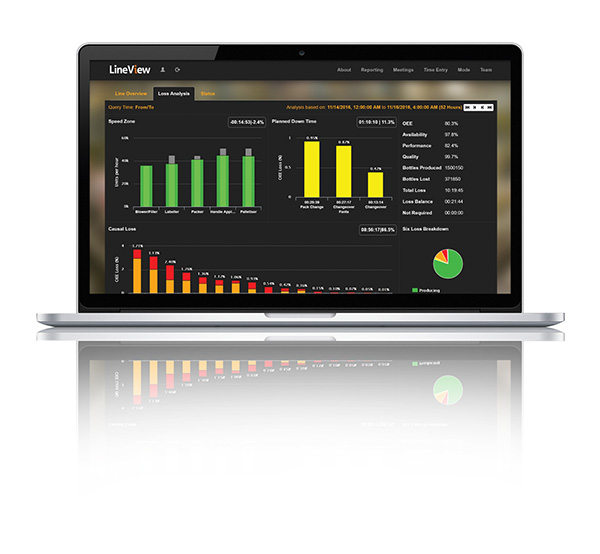Discover how OEE boosts resilience amid labour shortages, supply chain disruptions, and sustainability goals in 2024.
By Steve Adams CEO at LineView
In a world where unpredictability has become the norm, the last few years have served as a stark reminder that anything can happen. Reflecting on the challenges of the past year, one thing remains clear: the need for business resilience has never been more pressing. This is where the role of solutions already present in manufacturing operations could play a significant part in navigating the uncertain road ahead.
The shift towards extracting the maximum value from every existing asset has emerged as a clear response in fortifying businesses against unforeseen disruptions. Whether grappling with supply chain disruptions, market fluctuations, or global crises, a business’s resilience can be largely swayed by its capacity to derive optimal value from its resources, including operations, labour and sustainability.
Preparing your business for the future can often feel like solving a complex puzzle. By consolidating information into a unified platform, businesses can simplify decision-making processes and gain a clearer perspective on how to maximise their ROI.

Central to any business strategy lies an often-forgotten piece of the puzzle: data. The raw data collected across various facets of the production process is often an untapped resource waiting to be harnessed. Many manufacturers find themselves with a treasure trove of data but lack the processes to extract its full potential. This gap between data capture and effective utilisation is where businesses often falter.
In the journey towards resilience, recognising data as the cornerstone and implementing structured processes to harness its power becomes the catalyst for informed decision-making and operational single source of truth. Overall Equipment Effectiveness (OEE) is a measurement used to harness this data, offering the ability to identify the highest impact opportunities for productivity gains on your production lines.
OEE, a key metric for measuring a manufacturing process’s effectiveness, takes into account machine availability, performance, and quality to provide a holistic view of a production line’s efficiency. By determining performance against equipment capability, tracking OEE can empower businesses to be prepared for the challenges facing the food and drink manufacturing industry. We explore three of these key challenges below.
Labour shortages
In the aftermath of Brexit and the coronavirus pandemic in 2020, the food and beverage manufacturing industry has grappled with unfilled positions and lack of skilled workers in the face of significant labour shortages.
Against this backdrop, maximising team time becomes not only a necessity but a strategic imperative. It’s important for businesses to recalibrate their approach, ensuring that people continue to play an indispensable role in the manufacturing process. By implementing OEE monitoring, not only can operations achieve increased efficiency, but they can also optimise labour utilisation by employing streamlined processes. This approach minimises unplanned downtime and reduces the need for staff overtime, ultimately enhancing overall staff productivity through more efficient workflows. By leveraging technology, automation, and optimised workflows, the industry can navigate labour challenges, ensuring that every team member contributes meaningfully to the overall production process while offering positive returns on ROI.
Global supply chain disruption
Operating in the face of global supply chain disruptions and the threat of a global food crisis, with raw materials shortages creating price hikes across sectors, making the most of every asset becomes priority. Every business is now under pressure to produce more products faster and with higher quality, but with fewer resources. Often working with low margins, operators must put a stronger focus on maximising asset utilisation and increasing line efficiency to achieve increased productivity, reduced downtime and reductions in waste.
By monitoring OEE, businesses can quickly identify areas of inefficiency, getting ahead of unplanned downtime and maintenance while ensuring every resource is exploited to its full potential for more resilient and robust operations.
Reducing operational emissions
In the face of rising energy costs and increasing pressure to reduce carbon emissions, the need for more sustainable operations is imperative. Positive momentum can be seen across industry to adopt initiatives such as sustainable packaging however, the opportunity to reduce the environmental impact of running production lines must not be forgotten. For some, taking a stronger focus on reducing waste – such as water – and producing units with the most efficient use of resources – including minimising the energy required – may feel like an obvious objective but it is one often overlooked. By continuing to consider this challenge through an increased efficiency lens, production lines that are not operating effectively can see materials wasted and increased loss through the production of poor-quality products.
Manufacturing lines that run efficiently can reduce material waste and use fewer resources. Achieving more efficient operations also mean that production does not need to operate for as long, resulting in lower energy used and a more sustainable manufacturing process. This ultimately translates into a product with a lower overall carbon footprint per unit than can be achieved through initiatives that are only implanted at the end of production, for example. By striving for maximum OEE, businesses can support its transition to more sustainable operations while offering a significant opportunity to bolster business resilience and unlock additional CAPEX.
The food and beverage manufacturing sector faces a difficult challenge, finding itself at the intersection of labour shortages, rising operational costs and the threat of a global food crisis, not to mention low margins in an already challenging operating environment. Working towards improving OEE is a no brainer, in theory, but piecing it together, in practice, can become a challenging and often daunting feat.
End-to-end connected shop-floor monitoring and analysis systems, like LineView’s, offer a helping hand towards reaching this goal. Serving as an essential step to first understand all plant processes – from line monitoring to machine downtime tracking – before identifying the areas in need of adaptation to achieve optimum output while reducing wasted resources. By adopting software that essentially removes the burden of thought, and improves OEE, manufacturers can tap into the goldmine of data that is often left unexploited. Real-time data, which can facilitate enhanced use of team time, more efficient production and transparent reporting on sustainability initiatives.
Ultimately, working with a smart factory solutions provider like LineView to implement solutions that can help piece the data puzzle together for you, will empower your business to focus on the areas that allow you to maximise your ROI and build a more resilient future.

Steve Adams has over 30 years of experience in global supply chain management. As Former Vice President of Supply Chain at Coca-Cola European Partners, Steve has operated at all levels of the supply chain. His experience includes developing and sharing best practices for operational improvement across blue-chip beverage companies such as Diageo and the Coca-Cola system. Steve is passionate about efficiency and operational improvements that deliver a meaningful return on investment for food and beverage brands. He is an expert in Supply Chain improvement as well as the digitisation of manufacturing. Mr. Adams holds a Master’s in Business Administration from Keele University, HNC of Electrical Engineering from Ipswich College of Higher Education and an Honors Degree in Management of Technology from Open University. https://lineview.com/en/
Tune in for a timely conversation with Susan Spence, MBA, the new Chair of the ISM Manufacturing Business Survey Committee. With decades of global sourcing leadership—from United Technologies to managing $25B in procurement at FedEx—Susan shares insights on the key trends shaping global supply chains and what they mean for the manufacturing outlook.